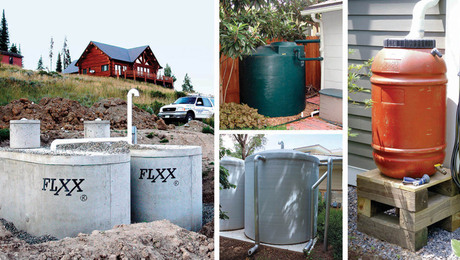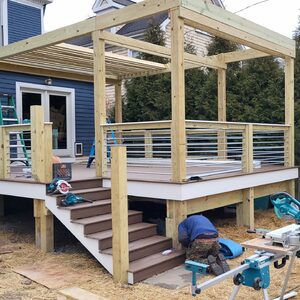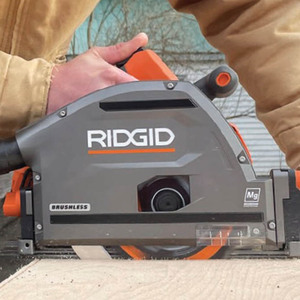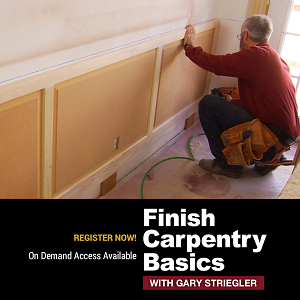I’m new to BT, and would appreciate any feedback. Thanks in advance.
My question is this: advantages or disadvantages of Durock vs. DenShield tile backer in a large custom shower- 6′-0 x 6′-0 with two rain hoods in the ceiling and 10 body sprays, two mixing valves, and one hand held nozzle. The tile layout is pretty intricate, with multiple trim pieces. The HO is an interior designer. I’ve had great luck using DenShield over the last few years without any callbacks. The current shower detailed above will be tiled by HO’s tile man, not my usual sub. He told me today that he would only install tile over Durock, not DenShield. I’m wondering if there’s a real difference in the products or if you really “Can’t teach an old tileman new tricks?”
Discussion Forum
Discussion Forum
Up Next
Video Shorts
Featured Story

There's a constant source of clean water for you to use, and all you have to do is collect it.
Featured Video
How to Install Cable Rail Around Wood-Post CornersHighlights
"I have learned so much thanks to the searchable articles on the FHB website. I can confidently say that I expect to be a life-long subscriber." - M.K.

















Replies
Welcome Wellbegun
>>>>"Can't teach an old tileman new tricks?"<<<<<
you tell me!!
I'm a convert...you may as well get in on the fun.
No more CBU's or WR rock for me!
http://www.schluter.com/english/products/2002/sectionh/part1.htm
be well
andy...
"i say to foobytor have a sit down ask him whats going on inside and please try to keep up . the rest will register with him..... and you never know the human spirit is an amazing resilient entity"alias
http://WWW.CLIFFORDRENOVATIONS.COM
Well I'd ask him why he wouldn't use Denshield. Has he had any failures? I've NEVER heard or read of anyone that has. I'd be very interested to know if and what he had fail.
Personally, I love Denshield. The advantage over CBUs (besides the obvious ease of use) is that there is a moisture barrier--a la Kerdi--OVER the backer board. Water penetration is impossible; mold becomes non-existent (as you know, cement board/hardi do absorb some moisture, thus the need for a poly/felt barrier BEHIND the backer.)
Having said that, I'd want a steam shower of the type you're describing to be bullet-proof.. I'd go with Kerdi here. (And I believe that Denshield actually contraindicates its use w/ 'steam showers'-I'd definitely check that out first.)
Well why the hell is it, I wonder, when ever someone has doubts about Denshield, and I say: "got any info on Denshield failures?", the thread instantly dies.. I mean, I like Denshield, and I trust it; but I've been skeptical..I did the research, I HUNTED for any reports of failures on the web--and everywhere else as well, and found NADA. Every time some joker comes on here says he heard someone say they heard from a 'tile friend' that Denshield sucks and I challenge it, the thread immediately dies and gets buried. Something smells about this.
Not a contractor here, just a diy. Tile failures I've seen have usually been with greenboard and then around shower/tub faucet handles and areas just above the tub. To me that indicates that the weak point is the edge of the greenboard. I don't use greenboard anymore but isn't the major component of Denshield similar to that of greenboard? If you cut a hole in Denshield for the faucet handle(s), will the exposed edge be a weak point? In a previous post I read that someone experimented by submursing Denshield in a bucket of water for a week with no change in its' character, so maybe Denshield is not made of the same material as sheetrock. I'm getting ready to purchase one of the two materials for my bathroom remodel so I'm still considering. One thing I know is that cement board is not damaged by moisture.
rick,
In a previous post I read that someone experimented by submursing Denshield in a bucket of water for a week with no change in its' character, so maybe Denshield is not made of the same material as sheetrock.
That was me who posted that experiment, I've used Denshield for 15 yrs. with no problems. One of the benefits of Denshield is that you can cut a much neater and tighter hole than you can with Durock,or the like, thereby helping to reduce water intrusion at these points.
One thing I know is that cement board is not damaged by moisture
that may be true, but water goes through Durock readily,and it's the damage that the water does behind the wall that wreaks havoc, and since the durock is uneffected the damage goes un-noticed. Try the experiment yourself! see for yourself! Denshield is a great product.
as for floors I prefer Hardibacker or Schluter products like Kerdi
Geoff
Greenboard is garbage. No relation to Denshield at all. I also experimented w/ DS in a bucket of water and was pleased to see it not dissolve (only noticed a very slight delamination of the acrylic coating at a corner.)Myself and others here have used Denshield for many years w/ great results. I've never seen or heard of a problem. Ever. And I'm still waiting to hear from the original poster about his 'failures'. Guess I won't hold my breath.
When using Denshield under tile in a simple tub/shower enclosure do you use mastic or thinset and why?
If you read the label on the side of the bucket you will know why.
Or you can do what I did, just do it & post that you did it then catch hell from everyone in here.“A universal peace, it is to be feared, is in the catalogue of events, which will never exist but in the imaginations of visionary philosophers, or in the breasts of benevolent enthusiasts.” —James Madison
Rick, mastic is not a wet area tile adhesive..was never meant to be. I've personally tore out plenty of 'tile and mastic on greenboard' surrounds. All of them soaking wet. Simple answer: tile installs are not entirely waterproof, and mastic is a water-soluble adhesive. Do the math.
Here's a problem for ya
Contractor repairing another contractors denshield failures
I just completed a 145 unit condo that had both densheild & durorock.
Denshield on the walls & durorock on the decks, for the most part.
All coated with RedGuard.
My shower is 100% Denshield installed in 2000, no failures on mine."The nearest thing to eternal life we will ever see on this earth is a government program." - Ronald Reagan
I have used hardi board and duro rock on a couple of projects with great success. I have never tried denshield.
I have been following this thread for the last couple of days. It was odd but I happen to be at the contractors counter at Lowe's yesterday P.M. and there was a salesman talking to the store manager right be side me. He was giving his pitch for Denshield and one thing really caught my attention. He stated:
All cement based board warranty only the board. Denshield warranties the board the tile and the installation.
"Denshield warranties the board the tile and the installation"Why, that's interesting. I'd like to find out more about it.Obviously, they warranty the board as it is installed w/ tile, not as it's found in the jobsite debris pile. Once again, for all the naysayers, when installed CORRECTLY, as any good tile installer will do--following manufacturer's specs, Denshield has never been shown to be anything LESS than the quality of a CBU surround. Hell, if I knew they guaranteed MY LABOR to repair a failed surround, I'd never use anything else.
I was not part of the conversation just ease dropping. My take on it was CBU failures you get new board for free (not much help). If Denshield failed they would pay everything to make it right. Thats all of the details I caught.
I tried soaking some denshield in a trough to make a 12' radius bend witha piece that was a 1' wide & 6' long. 48 hours submerged, I got a slight deflection then snap.
Sheetrockers on my job were laughing at me for trying to bend it.
I ended up using greenboard there since it was on the outside of the shower.“A universal peace, it is to be feared, is in the catalogue of events, which will never exist but in the imaginations of visionary philosophers, or in the breasts of benevolent enthusiasts.” —James Madison
Here are my thoughts, for what they are worth. I am a diy'er and I just completed a large bathroom reno (demo of shower, re-framing, moving shower drain, etc.). I have a 6' x 4'6" shower, with a rain head, shower bar, steam system, 2 mixing valves, etc. I did some research on the web and I didn't get anywhere either, however when I talked to various people they all recommended Durock over Denshield. One place was a tile place, another a very reputable building supplier and another drywall distributor. All of them basically said the same thing "if you are going to live there for longer than 5 years, I would definately do Durock". I got this same answer when I asked about Kerdi. As such, I went with Kerdi and Durock for the entire shower.
The one thing about Denshield is that the membrane does act like Kerdi, when you fasten to the walls, this penetrates the barrier and this is where problems start.
I understand that CBU's are much more difficult to use, but I have NEVER heard of anyone having problems with CBU when installed properly. I talked to one bathroom reno guy who said he used to swear by Denshield and he found it didn't hold up as well as Durock, so he switched back.
Another thought, from a HO's perspective, I was originally going to bring in a bathroom reno company to do the whole remodel and as soon as he mentioned Denshield is what he uses, I wouldn't go with him. I am all for using new, innovative products, but based on the conditions of the studs behind the shower I demo'd, I would always use extra precaution and use Kerdi over CBU.
On another note, I heard that Denshield is excellent for "wet" areas like bathrooms, etc., just not the shower itself.
I suppose this long-winded response would represent a lot more than my $.02, but I suppose it depends on how valuable this is??? Good luck!
Read the manufacturer's limitations for Denshield.."not acceptable for steam showers". You've got to use a product within it's limitations.CBU's do intuitively seem to be more durable. But they do harbor mold. I've torn one or two out that had terrible mold problems. Denshield and Kerdi nix this. Again, people like to talk smack, but, hell, at least show me some pics of a failed denshield surround, please. RE: the screw penetration of the Denshield causing points of water penetration--not so much a prob. 'Spackle' the screws w/ thinset. Note that all seems and corners are to be "fiberglass taped and thinsetted" as per manufacturer specs. for the same reason. Also I limit screw penetrations w/ the use of a drywall adhesive to install the backer. Show me a pic of a failed Denshield surround w/ 'water intrusion' at a screw hole, and I'll be a (un)believer.
As a general construction laborer I can offer this comparison, not based in any material spec. or manufactures recommendations but in vast experience of having to do general site clean up of large job sites and my own observations. Have you ever seen a piece of dry wall left lying on a wet floor or scrap left out side? It turns in to a clumpy, crumbled mess that I challenge you no matter how small the piece, to pick it up in tact with out it falling apart from the paper backing. I've picked up plenty of junk Densheild that acts exactly the same way as regular drywall does if it's been left long enough, including dotted with mold on the back side. However I can tell you, I've never picked up a piece of junk Dura rock, no matter how long it's been there that acts this way. It always seems to still be in "use able" shape unless it has been physically crushed somehow. I believe the difference is in Dura rock being a cement base verse gypsum base that is more susceptible to re-dissolving with water.
Your tiler decides what product to use
This is not a matter of teaching an old dog new tricks. The fact is that he is responsible for the long-term performance of the installation and to that end he will only use Durock. He has to warrant his work, not you, the client. Can you respect that? If not, feel free to hire another tiler who is willing to go with another brand of tile backer.
IF I were the tile installer and I was asked to use a tile backer I was not comfy with, I'd include a clause in the contract statng that I could not warrant workmanship. Then what would you, the client, do?